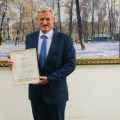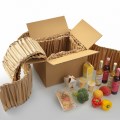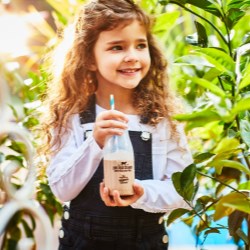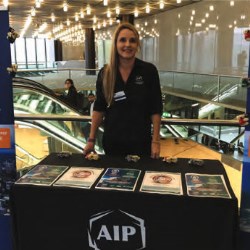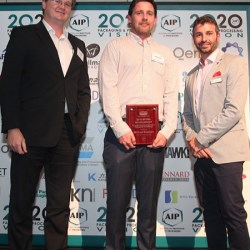If this is your company, CONTACT US to activate Packbase™ software to build your portal.

It was not the seven packaging professionals that travelled to Kyabram in Victoria on a cold and foggy day in July 2017, but the newly commissioned Kyabram Line 7 positive-pressure production line dedicated to infant formula can production that can claim the title.
Jamestrong Packaging is a leading packaging supplier to most of Australia and New Zealand’s well-known brand owners. The largest supplier of aerosol cans and nutrition cans in Australasia invited members of Australian Institute of Packaging [AIP] in March 2016 to visit the factory.
At that time Line 7 was only in the early stages of installation. In the previous August Jamestrong purchased a 6500 square metre warehouse immediately beside the Kyabram, manufacturing plant. It has since been converted to incorporate a positive-pressure environment for an infant formula can production line and the AIP was given the opportunity to come and have a look at it now running in production.
After assembly Jamestrong Packaging Australasia Managing Director John Bigley and Peter Romano Kyabram Manufacturing Manager gave a comprehensive overview of the antecedents of the company and explained how things work and happen at the factory.
Metal packaging is one of the oldest forms of food packaging and is not only cost effective but one of the most recycled and sustainable packaging products available today
Jamestrong Packaging has manufacturing facilities located throughout Australia and New Zealand, operating in three distinct sectors - Food cans, Nutrition cans and Aerosol.
A new line is being built in New Zealand predominantly to cater for the growth in formula made from a2 milk. a2 Platinum®, a world first infant formula and toddler milk drink is rich in the pure and natural a2 beta casein protein and naturally free from the A1 beta casein protein.
Jamestrong manufactures and supplies tinplate cans to the following key market segments:
- Dry Powder (infant formula, milk powder, adult nutrition)
- Food ( soup, fruit and vegetables, meals)
- Dry beverage ( milk modifiers, beer kits)
- Pet food (wet dog and cat food)
- Aerosols (personal care, household, industrial, pharmaceutical)
In the discussion period an interesting statistic was divulged. 380million food cans per annum are produced by Jamestrong in the region and the staff number is 380 so a KPI on production per person would be easy to compute, however like all statistics there is room for debate for the same employees also produce 170 million aerosols cans.
The safety program at the plant also fits in the “magnificent” category for there has not been a lost time injury for nine years. All workers are involved and even the MD and Manufacturing Manager have been brought to heel for minor infractions. There is a specific management role for continuous improvement and every employee is involved. All issues raised are followed to a close out.
After being outfitted in all of the necessary personal protection equipment and that needed to maintain the integrity of the cans being produced at world’s best practice rates the tour commenced. [Even Yul Brynner would have to don a hair net] The management team were available as tour guides and to answer any questions arising.
For the visitors that had not been at the first visit the tour covered both the old and the new. Basically the process is the same except Line 7 is installed in a clean room and is more robotic and technologically advanced. [That is not to decry the earlier operation]. At Line 7 only approved employees in specialised uniforms can enter their work area. Air-locks and zoned areas keep the outside out and the inside in.
We saw pallets of printed tinplate sheet [manufactured at the company’s Milperra plant] and can ends ready to be fed into the canmaking line. The printed sheets are slit into can blanks and the blanks then rolled to form a can before being fed to the machines that weld the side seam and seam on the end. They are then palletised and stretch wrapped for transportation to the customers.
In the original plant the process is for the finished cans to go through a vision system and an air washer where the cans are turned over so any impurities are removed. Line 7 is more advanced:-
Whilst Line 7 also has an air washer it has a state of the art Pressco vision system that identifies and isolates any defects in packaging integrity and print errors. The technology uses a multi-camera system to inspect the can at production speeds. The collected information is then compared with a template and any discrepancies between the two are logged and tracked.
The total in-line vision system is equipped with seven individual cameras to ensure complete vision of each can. Cameras are in place to inspect the top, bottom, ends and sides of the can as well as an internal view for a complete 360-degree image of the packaging.
Line 7 produces close to 300 infant formula cans per minute, and has programmed shut down for a thorough cleaning after a certain volume of cans pass through. We arrived during a scheduled cleaning period but much was discussed until the line started up again.
The robots can hold one spellbound as they go about their daily tasks. The one feeding the tinplate blanks to commence the production has a choice of three places from which to pick the stack, but the sequence is known only to itself.
At the end of the line where the finished cans are stacked on pallets and shrink-wrapped two robots have to work in unison to complete the task.
This $8 million investment in Line 7 follows the company's earlier $13 million investment in a world's best metal printer, enabling it to offer its customers an unsurpassed print and can making supply chain.
In 2016/17 AUD40 million of investment was supported by the Chinese owners of Jamestrong and further investment maybe necessary as the export momentum of canned formula and food grows.
For the “trivia” file James is the English name of the Chinese Chairman to derive the name change when the business was obtained from Ardagh Group in late 2014.
The tour being over Anthony Peyton Victorian Chair on behalf of the Institute thanked John and Peter and made a presentation of a framed certificate together with a small gift.
Written by Michael B Halley FAIP.



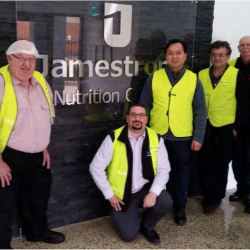
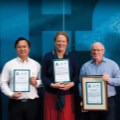
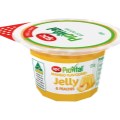
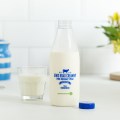
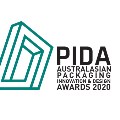
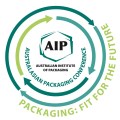
.jpg)



